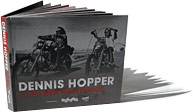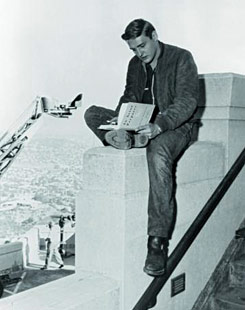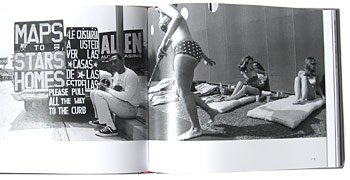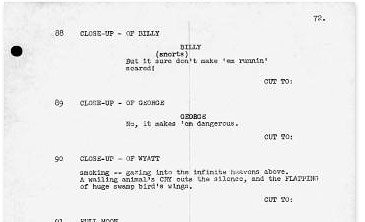Renaissance Man
Multi-Talented American Badass
On March 26th, Dennis Hopper was given a star on Hollywood's Walk of Fame. On May 17th, he'll turn 74. On top of all that, the man was recently diagnosed with cancer, so there's no better time for looking back at a career that defied the odds, broke barriers and made an indelible mark on not just American culture, but America as a whole. Dennis Hopper & the New Hollywood ($32 at Amazon) was just released by Rizzoli and looks back at the legend's astounding career that includes (but isn't limited to) acting, directing, photography and painting. Hopper was an actor that survived the old Hollywood studio system and then helped redefine the film industry with his movie Easy Rider.
 By keeping one foot in mainstream cinema and the other firmly planted in the anti-establishment, Dennis Hopper was uniquely positioned to not only partake in, but also capture the culture at large.
By keeping one foot in mainstream cinema and the other firmly planted in the anti-establishment, Dennis Hopper was uniquely positioned to not only partake in, but also capture the culture at large.
While it wasn't his first role, one of the actor's first big films was Rebel Without a Cause. In fact, it was James Dean who told a 17-year-old Hopper that he should "start looking at the world through a frame." He picked up a camera soon after and went on to become a well-respected photographer, shooting everything from his friends like Paul Newman and James Brown to the graffiti in and around Venice Beach, California. Vincent Price would eventually introduce him to the art world and got him to start collecting. One of his first acquisitions was an early Andy Warhol that set him back just $75. Hopper would later be featured in one of Warhol's signature silk-screens.
Matthieu Orléan co-authored Dennis Hopper & the New Hollywood. And as curator of the Cinémathèque Française in Paris, he organized the exhibition detailing Hopper's work and art collection which led to the book. We caught up with Orléan for his take on the renaissance man.

Hopper reading "An Actor Prepares" on the set of Rebel Without a Cause. (By Nicholas Ray, from the Academy of Motion Pictures Arts and Sciences)
Q&A with Matthieu Orléan
![]() The book was born out of your exhibit at the Cinémathèque Française ... how'd that come about?
The book was born out of your exhibit at the Cinémathèque Française ... how'd that come about?
![]() We organize about two shows a year that have to do with cinema and its relationship to culture. Dennis Hopper was the perfect person for that—I mean, he's an actor, a director and he's got a great way of capturing reality, which shows in his artwork. We wanted to explore all the phases of his life and the influences that led to Easy Rider and the relationships he has with the underground LA art scene.
We organize about two shows a year that have to do with cinema and its relationship to culture. Dennis Hopper was the perfect person for that—I mean, he's an actor, a director and he's got a great way of capturing reality, which shows in his artwork. We wanted to explore all the phases of his life and the influences that led to Easy Rider and the relationships he has with the underground LA art scene.
When did you first meet him?
When I was researching for the exhibit, there were no real books or articles about his life in terms of his artwork or his personal collection. So I went to Los Angeles and it was clear that we had to do this. When you see the quality and the size of his pieces in person, it's so much more inspiring and impactful.

"Bill Cosby, 1962" and "Sundays at the Hanson's, 1964."
(By Dennis Hopper)
And how'd you choose the individual works of art?
I went and met with Dennis and, at first, it was overwhelming. He's got a wide collection and in his home, he has amazing pieces on his wall, but none of them are his own. He's very humble. He's got a keen eye and a fresh way of looking at things. We went through a lot of his favorites and then I was free to go, like archeologist, and dig around among the clouds of dust through all of his works in storage. I found some amazing stuff.
Favorite find?
I found this stack of papers, brushed off the dust from the cover and it turned out to be an old script with notes from Easy Rider. It was behind an old vacuum cleaner.

In your opinion, why has he been so successful in so many different mediums?
It is really rare, isn't it? He has this strong relationship to reality and to urban cultures, which is something you find in all his work. His photography was almost rehearsals for his eventual directing. He's got a strong relationship to the present and is very skilled at capturing movement within a frame. There's a language to his work. Even if they're not speaking.![]()
Dennis Hopper passed away on May 29, 2010.
Comment
Lead photo: "Dennis Hopper," 1990 Gelatin Silver Print. Victor Skrebneski Collection, Chicago.
© Copyright 2024 Valet Media LLC - All Rights Reserved. | Privacy Policy | Terms & Conditions